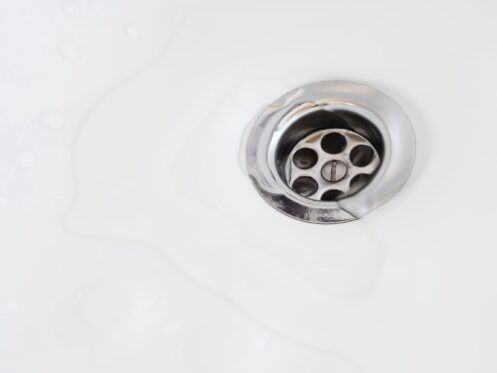Professional plumbers cannot overstate just how important proper drainage is to your plumbing system. It is an essential part of having a healthy and comfortable home. Not having proper drainage can lead to a wealth of problems in your plumbing system, from clogs to sewer backups. If you do not deal with these issues promptly, it could result in the need for costly repairs. In addition, poor drainage can damage your possessions, cause mold growth in your home, and, in severe cases, degrade your home’s structural integrity. Practicing preventative measures can help you avoid many plumbing problems. When there is an issue that requires professional attention, acting quickly will keep your plumbing system in tip-top shape.
Clogs and Blockages
While your plumbing system may appear complex, it’s actually fairly simple. Fresh water comes in from your main water line from the municipal water system or your well, and wastewater drains to the sewer main for processing. Your wastewater system has drainage pipes inside your home and a sewer line from your house to a sewer main.
Simple clogs in the drainage pipes in your house that affect an individual drain or toilet can usually be cleared with a plunger or snake. However, an issue in the sewer line is more difficult to locate and fix and requires the experience of a licensed plumber. You may also have to contact a professional for a clog in your internal plumbing that you can not clear yourself. In addition, if you have a fixture like a toilet that clogs often, it is advisable to contact a plumber because frequent clogging issues may indicate a significant underlying issue with the fixture.
Frequent clogging in multiple drains or overall slow-draining plumbing will also most likely require professional attention. Not dealing with a plumbing system that is not working as it should can pose health risks to you and your loved ones. If left untreated, you could be dealing with a large amount of bacteria and germs. They thrive in damp, dark environments, like partially clogged drainage pipes. In addition, slow drains can cause unpleasant odors and become a breeding ground for insects.
What to Do When You Have a Clog
Clogs within indoor plumbing usually occur in toilets or the trap underneath sinks, tubs, and showers. The trap is a U-shaped curved pipe. It is designed this way so that water sits at the bottom and acts as a barrier to prevent sewer gases from coming up the drain. Unfortunately, it is also a place in your drainage system where debris can build up and cause a blockage.
If only a single drain is blocked or flowing slowly, it indicates that you are dealing with an interior drainage issue rather than a sewer line problem or system-wide plumbing issue. Plunging or snaking the drain to push the blockage through the trap will often clear the clog. If you cannot unclog the pipe with a plunger or snake, you may be tempted to use a drain cleaning liquids or gels. This is not recommended because these products contain harsh chemicals that can erode your pipes. They are also toxic to humans and pets.
Preventing a Clog in the Kitchen
Taking preventative measures to help avoid clogs will promote proper drainage and maintain a healthy plumbing system. In the kitchen, food scraps should never be allowed to go down the drain unless you have a garbage disposal. Even if you have one, you have to be careful what goes down the drain. Garbage disposals can only deal with biodegradable items that can be easily ground up. For instance, your disposal will not be able to process coffee grounds or pasta very well. In addition, it will do nothing to prevent blockages caused by oil, grease, or fat building up in your pipes. These items should be thrown in the trash instead.
Preventing Clogs in the Bathroom
First off, do not flush anything down your toilet that is not toilet paper or human waste. This includes things like coffee grounds, food scraps, paper towels, and non-disposable baby wipes. Even adult wipes that are labeled as disposable can cause plumbing problems, and you should discard them in the trash.
In the bathroom, hair is a significant problem for your drainage system. This is especially true when it is combined with toothpaste and soap scum. Investing in a strainer is an easy way to prevent a considerable amount of hair and other debris from going down your sink, shower, and bathtub drains. These fit in drains and capture much of the hair that would otherwise go into your drainage system. However, even using a strainer will not capture all the hair. Before a shower, consider brushing your hair away from the sink so the hair ends up on the floor. Afterward, it can easily be swept up and disposed of, preventing it from causing plumbing problems. Men should lay a towel over the sink to capture hair before grooming their faces. Cuttings from beard trimming can easily make it through a strainer and build up in your plumbing.
Preventing Clogs in the Laundry Room
As with any other pipe, laundry drains are prone to clogging if you do not take preventative action. A blocked drain in the laundry room can be a major issue because the amount of water involved can easily cause extensive water damage.
A mixture of lint and soap residue causes most laundry drain clogs. Washing your clothes produces a lot of lint; what you see in your dryer filter after a load is only part of what comes off your clothing and other items. The rest drains out of your machine with the wastewater before you even put the laundry in the dryer. To prevent clogs, you should make sure that the lint filter at the end of the washing machine drain hose is present and working correctly. The most effective filters are made from metal mesh and securely attached to the hose’s end.
Like in your bathroom, hair can cause problems with laundry room drains. Before washing bedding and pillowcases, consider bringing them outside and shaking them out, especially if you let your pet sleep with you.
Extremely dirty clothing can also contribute to laundry drain problems. If your little ones get their clothes muddy, shaking the dirt off them is probably a good idea before running them through the laundry. In addition, if you have clothing that has become stained with a lot of grease or oil, it may be better to wash it at a laundromat than expose your home plumbing to these substances.
Contact the Professionals
At Summit Heating, A/C, Plumbing & Electrical, we know that having a drainage problem you can not address quickly with a plunger or snake can be stressful. We have been assisting the residents of Littleton, CO with plumbing issues since 1998. We also install, repair, and maintain heating and cooling systems. Give Summit Heating, A/C, Plumbing & Electrical a call today for any of your plumbing or HVAC needs.


